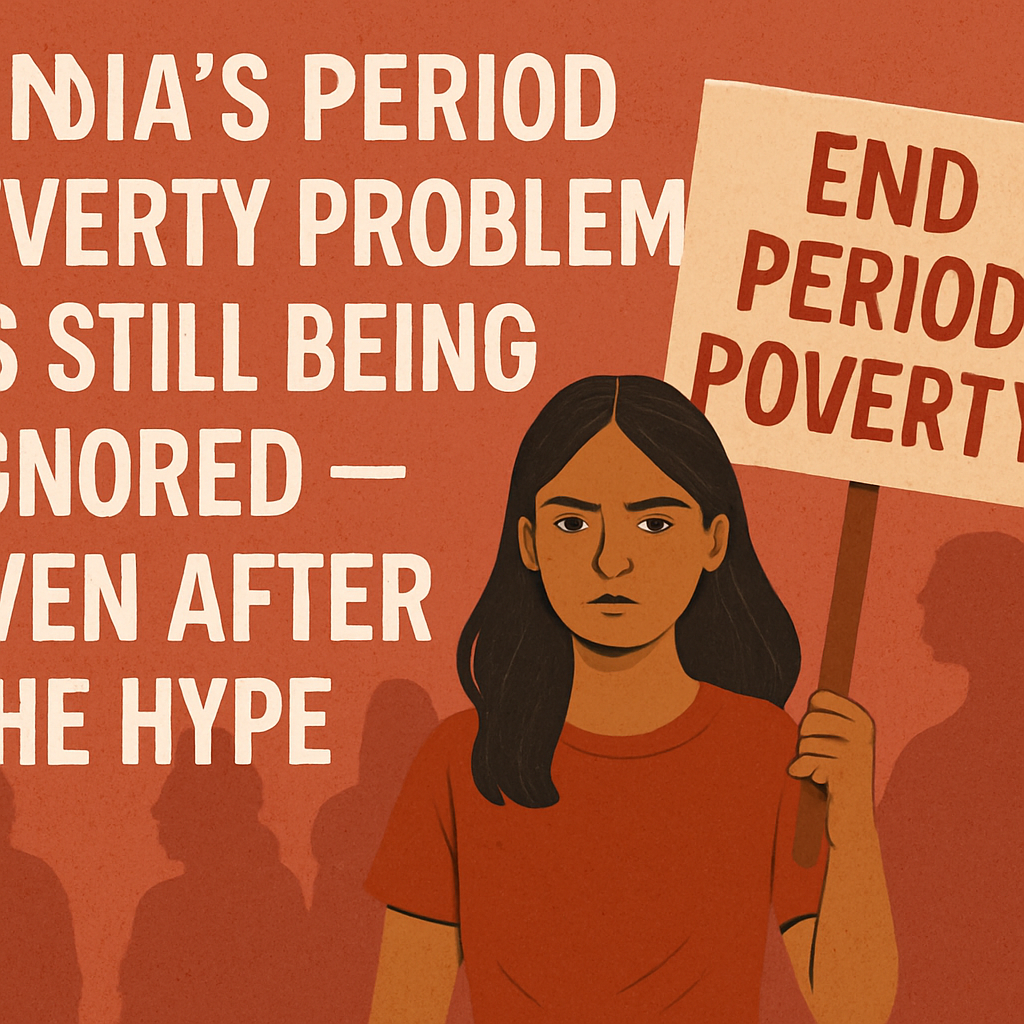India’s Period Poverty Problem Is Still Being Ignored — Even After the Hype

Introduction
In a post-PadMan India, you would expect that conversations about menstrual hygiene and period poverty would have become mainstream. But as of 2025, the stark reality is that millions of women and girls still lack access to affordable, safe menstrual products. Despite years of advocacy, government schemes, and viral social media campaigns, period poverty continues to be an invisible crisis, particularly in rural and underserved urban communities.
The silence is not just frustrating — it’s costing girls their health, education, and dignity.
What Is Period Poverty, Really?
Period poverty refers to the lack of access to menstrual hygiene products, education, and sanitation infrastructure. It isn’t just about not having a sanitary pad. It’s about not having a private bathroom, clean water, or even the basic knowledge that menstruation is normal and healthy.
In India, over 23 million girls reportedly drop out of school annually due to lack of menstrual hygiene management. That’s not a statistic — that’s a national emergency.
What Happened After PadMan?
The 2018 film PadMan sparked a national dialogue. NGOs and influencers rushed in, distributing free pads and launching campaigns. The government responded with schemes like the Suvidha initiative, which aimed to provide low-cost biodegradable sanitary pads through Jan Aushadhi Kendras.
But the buzz faded. Distribution remained inconsistent. Supply chains broke down in rural areas. Stigma returned where awareness didn’t stick.
"They gave us pads once, then never came back," shared Rani, a 16-year-old from Bihar.
A movement built around a film cannot outlast the daily logistical, cultural, and political barriers faced by Indian girls.
Where Are We in 2025?
In 2025, India still lags behind. While urban areas have seen a rise in eco-friendly menstrual brands and reusable alternatives like menstrual cups, 70% of women in rural India still rely on cloth — often unsterilized, reused, and unhygienic.
Sanitation in schools remains abysmal. A report by Swachh Bharat Mission found that only 58% of government schools had separate toilets for girls, and among those, many lacked proper disposal units for sanitary products.
The Cost of Silence
- Health Risks: Using unclean materials can lead to urinary tract infections (UTIs), reproductive tract infections, and infertility.
- Missed Education: Girls miss up to 5 days of school a month due to menstruation-related discomfort, stigma, or lack of resources.
- Social Exclusion: Taboos around menstruation still result in girls being excluded from kitchens, temples, and social spaces.
Are Government Programs Enough?
Schemes like Rashtriya Kishor Swasthya Karyakram (RKSK) and Suvidha exist on paper, but implementation varies widely. Many rural ASHA workers are not trained to educate girls, and logistical challenges plague consistent delivery.
Some states, like Kerala and Tamil Nadu, have done better by integrating menstrual health into school curriculums and offering pad-vending machines. But these are exceptions, not the rule.
The Rise of Grassroots and Digital Campaigns
Thankfully, activists and NGOs haven’t stopped. Organizations like Goonj, Boondh, and Sheroes continue to run awareness drives and distribute hygiene kits. Digital platforms like Menstrupedia use comics and videos to educate.
Social media campaigns like #BleedWithDignity, #PadsAreBasic, and #RedIsNormal have helped start conversations, but have struggled to translate that buzz into policy.
Meanwhile, menstrual product startups are thriving in urban markets. Brands like Nua, Carmesi, and Pee Safe focus on comfort, aesthetics, and wellness — a welcome change, but one that caters mostly to the privileged.
What Needs to Change
- Pan-India menstrual health curriculum in schools
- Trained health workers and educators in every district
- Affordable pad access in every panchayat
- Sustainable waste disposal systems in rural and urban areas
- Shifting the narrative from hygiene to dignity and empowerment
Conclusion: The Blood That Still Doesn’t Speak
For India to truly progress, periods must stop being a punchline, a whisper, or a source of shame. Until a girl in the remotest village has access to a clean pad, a safe toilet, and the freedom to speak about her body without fear, the battle isn’t over.
Tag a campaign that’s creating change. Donate a pad. Start a school drive.
The period poverty crisis in India doesn’t need more silence. It needs you.



